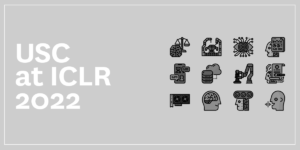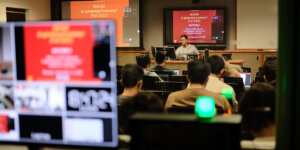The USC School of Engineering solidified its status as a leader in a key emerging area of computer science, Intelligent Agents, by hosting a special week-long “Agents School” Jan. 6-11.
The school, held at the Marina Mariott Hotel, was the first of its kind ever held and attracted an overflow enrollment.

Randy Hill (left) and Milind Tambe were organizers of the world’s first Agent School
Sixty-two graduate students came from as far away as Japan and Slovenia to listen to presentations by top scientists in the field, many from USC computer science, Information Sciences Institute, and the Institute for Creative Technology; but also faculty from Carnegie-Mellon, the University of Michigan and other centers. More than 20 applicants had to be turned away for lack of space.
Milind Tambe, an associate professor in the department of computer science and project leader at ISI, was chair of the event, with ICT Deputy Director of Technology Randall W. Hill Jr. serving as arrangements chair.
Tambe explained the significance of the field: “Agents,” he said, “are artificial entities, computer programs or robots that exhibit autonomy, purposefulness, behavioral flexibility, and even social capability.”
Researchers in the field, he continued, “vary on the specific characteristics of agents, but there’s general agreement that such software has the ability to respond to complex situations in flexible, ‘intelligent’ ways.”
The subject is relatively new, with useful applications only beginning to appear in the early 90s. “USC was well positioned,” Hill said, “It had expertise in place, recruited more, and became a leader.”
The worlds first autonomous agents congress took place at ISI in 1997, Tambe said, “and now the first agent school was here too.”
Students at the school seemed to agree that the trip was worth the time and expense (in addition to travel and lodging, tuition of $250 was charged). A post-school poll found that 95 percent thought the presentations were either excellent (37%), very good (48%) or good (10%).
Tambe said that the event was a service to the field, offering students a broad sampling of a wide ranges of approaches used to create agents. Hill said it was also an excellent experience in collaboration by computer science, ISI and ICT “all of USC’s institutes pitched in and worked together.”
Also, importantly: “We wanted to demonstrate how strong USC is in the field of agents, ” Tambe said, “and that seems to have gotten through.”
Published on January 11th, 2002
Last updated on August 10th, 2021












